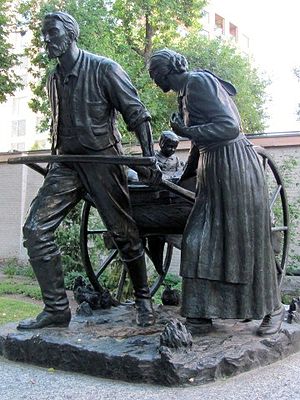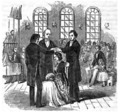Portal:Latter Day Saint movement
|
Welcome to the portal of The Latter Day Saint movement
Introduction The Latter Day Saint movement (also called the LDS movement, LDS restorationist movement, or Smith–Rigdon movement) is the collection of independent church groups that trace their origins to a Christian Restorationist movement founded by Joseph Smith in the late 1820s. Collectively, these churches have over 17 million nominal members, including over 17 million belonging to the Church of Jesus Christ of Latter-day Saints (LDS Church), 250,000 in the Community of Christ, and several other denominations with memberships generally ranging in the thousands of members. The predominant theology of the churches in the movement is Mormonism, which sees itself as restoring again on Earth the early Christian church; an additional doctrine of the church allows for prophets to receive and publish modern-day revelations. A minority of Latter Day Saint adherents, such as members of Community of Christ, have been influenced by Protestant theologies while maintaining certain distinctive beliefs and practices including continuing revelation, an open canon of scripture and building temples. Other groups include the Remnant Church of Jesus Christ of Latter Day Saints, which supports lineal succession of leadership from Smith's descendants, and the more controversial Fundamentalist Church of Jesus Christ of Latter-Day Saints, which defends the practice of polygamy. (Full article...) General images -The following are images from various Latter Day Saint movement-related articles on Wikipedia.
Selected article The Mormon handcart pioneers were participants in the migration of members of the Church of Jesus Christ of Latter-day Saints (LDS Church) to Salt Lake City, Utah, who used handcarts to transport their belongings. The Mormon handcart movement began in 1856 and continued until 1860. Motivated to join their fellow church members in Utah, but lacking funds for full teams of oxen or horses, nearly 3,000 Mormon pioneers from England, Wales, Scotland and Scandinavia made the journey from Iowa or Nebraska to Utah in ten handcart companies. The trek was disastrous for two of the companies, the Willie and Martin companies. Both started their journey dangerously late in 1856 and were caught by heavy snow and severe temperatures in central Wyoming. Despite a dramatic rescue effort, more than 210 of the 980 pioneers in these two companies died along the way. John Chislett, a survivor, wrote, "Many a father pulled his cart, with his little children on it, until the day preceding his death." (Full article...)Selected location
Selected schismatic histories
The Church of the Firstborn was a sect of the Latter Day Saint movement that formed as an offshoot of the Church of Jesus Christ of Latter-day Saints in 1861 and was involved in the Morrisite War. Its adherents were known as Morrisites, and schismatic sects have been defunct since 1969, excepting the Order of Enoch. (Full article...)
OutlinesRelated portalsKey biographies
Joseph Knight Sr. (November 26, 1772 – February 2, 1847) was a close associate of Joseph Smith, founder of the Latter Day Saint movement. Knight provided significant material support to Smith's translation and publication of the Book of Mormon. (Full article...)
Selected image In the Mormon fundamentalist movement, the 1886 Revelation is the text of a revelation said to have been received by John Taylor, third President of The Church of Jesus Christ of Latter-day Saints (LDS Church), that is claimed to restate the permanence of the principle of plural marriage.
Did you know (auto generated)
Selected Anniversaries
Selected quote
TopicsFeatured contentCategoriesWikiProjectsAssociated WikimediaThe following Wikimedia Foundation sister projects provide more on this subject:
Discover Wikipedia using portals | ||||||||||





































